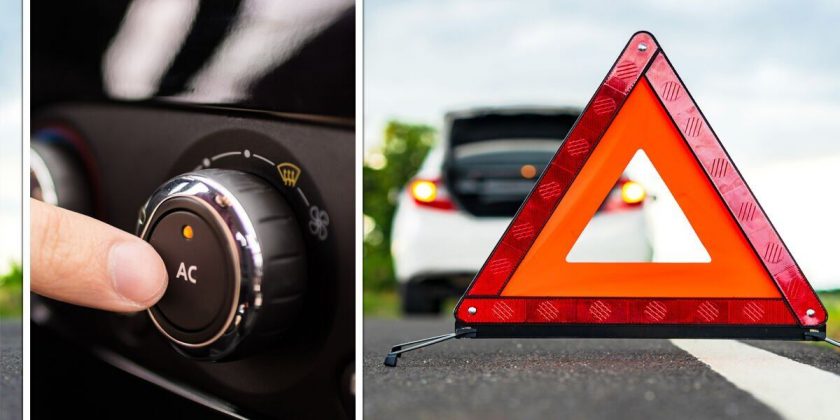UK Weather: Major heatwave as temperatures soar
We use your sign-up to provide content in ways you’ve consented to and to improve our understanding of you. This may include adverts from us and 3rd parties based on our understanding. You can unsubscribe at any time. More info
Motorists can be fined up to £2,500 and receive three points for using a vehicle in a dangerous condition. This could occur if a driver has failed to do several vehicle safety checks before making long car journeys, to ensure the car is safe to drive, with thousands expecting to hit the road.
Many drivers are sure to be heading on long road trips to enjoy the heatwave meaning these checks are vital.
If the offence is committed within three years of a previous conviction for a similar offence, then drivers could face an obligatory disqualification.
One of the most important checks that drivers should do is to check to see if their clutch pedal is hard as this could be a sign of a failing clutch cable.
For manual cars, every time the gear is changed, the clutch comes under pressure, and over time this can affect a vehicle’s clutch cables.


One major sign of a failing clutch pedal is a hard clutch pedal.
A cable experiencing problems will struggle to move when the clutch pedal is pressed resulting in a pedal that resists depression when stepped on.
If a driver continues to press on the pedal when this is occurring, it could cause the cable to break and result in an inoperable clutch.
Motorists are urged to get their car checked immediately if they notice a change in how their clutch feels.
DON’T MISS
Motorists will be ‘pleasantly surprised’ when using hypermiling tricks [ADVICE]
Hidden features in your car you never knew existed [INSIGHT]
Drivers urged to use hypermiling hack to boost efficiency 25 percent [IMPORTANT]
If they need to replace the clutch, this could set them back around £475 on average.
Mike Thompson, Director at Leasing Options, has advised drivers to be cautious when out on the roads this week and to check their car before setting off.
He said: “It’s important that before starting a summer car journey, drivers carry out some simple quick checks to ensure their vehicle is in a safe condition to drive long distances.
“Motorists who fail to do so could risk breaking down mid-journey and also face a fine if their vehicle is deemed in a dangerous condition.
 Book here
Book here
Book your MOT with the UK’s #1 MOT tester – just click the link to book online.
 View Deal
View Deal
“To prevent this from happening drivers should check the interior and exterior of their cars for any faults before setting off on their fun staycation.”
Britons are preparing to face what could be the hottest June day ever with mercury potentially hitting 35C on Friday.
It is expected that the UK will be hotter than Jamaica, Hawaii, Costa Rica, the Canary Islands and Cyprus.
Motorists should also check for signs of a coolant leak to avoid the engine overheating as this could lead to repair costs of around £200.

The coolant is pumped around the system via the water pump, with the radiator generally situated at the front of the vehicle and low down to allow the cooler dense air to flow through it when driving.
When the vehicle is in slow moving traffic or stationary, drivers may hear the radiator/coolant fan turn on, these are designed to draw air through the radiator mimicking air flow and cooling the coolant.
To do this, the vehicle needs its coolant at maximum level and any leaks within the whole system will reduce the radiator’s ability to cool the coolant, causing the engine to run hotter, thus causing damage.
When checking the car, drivers may notice the coolant level dropping, with Leasing Options instructing drivers to “have a nosy” around the engine bay for signs of leaks, or weeping around the lower parts of the front bumper.
Dim or flickering lights can also indicate a fault with the car alternator, which can cost £275 to replace.
The alternator is responsible for supplying electrical needs to a vehicle, when there is a problem with the alternator it begins to show through car features that use electricity.
One of the most common signs to watch out for is dimming and flickering headlights or an electric speedometer no longer working.
If the temperature of the car rises quickly and the ignition warning light comes this could be a warning sign that the belt that drives the alternator and water pump could have a fault.
In this case, drivers should not attempt to restart their vehicle.
Source: Read Full Article
